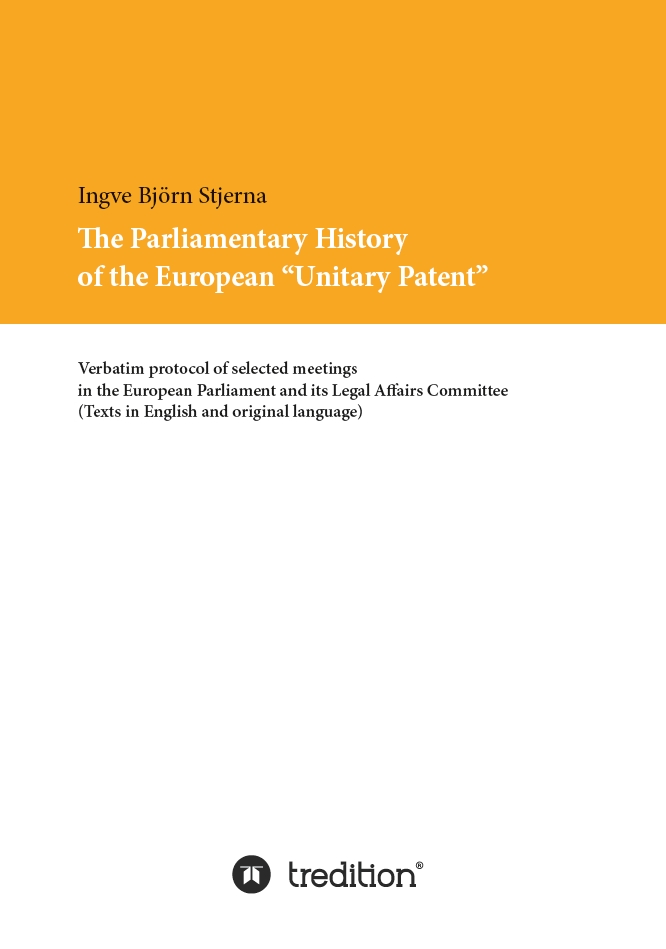UPC is antidemocratic and the public is not being consulted at all about it
"It`s not the voting that`s democracy; it`s the counting."
--Tom Stoppard

Credit: ZBM patents
Summary: Roundup regarding the Unitary (or Unified) Patent Court, the latest incarnation of a long-going and nym-shifting effort to transform Europe's patent law, culminating in the publication of a detailed new book from Dr. Ingve Björn Stjerna
THE UPC is not a new thing. It's just the latest name of an old thing. I have personally been writing about it for many years and so have few people (other than patent lawyers and politicians) including Ingve Björn Stjerna. Going back to the Charlie McCreevy days (around 2008) and the Michel Barnier days (around 2010), it should quickly become abundantly clear that no matter how much resistance Europeans put up to stop this antidemocratic process, it just keeps coming back, usually with a new name that nobody knows anything about. Earlier this week MIP published this interview with Carol Arnold of Shell (yes, that Shell). Unsurprisingly, this covered the UPC. It said that "plans for the UPC have been met with mixed feelings. As the procedure for judge selection continues, many remain optimistic about the Court, while others become increasingly fearful about the prospect of forum shopping and patent abuse."
We have already written many dozens of articles about the UPC, in addition to
hundreds more about the same thing under another name (e.g. "Community patent"). What will it take to stop this injustice? Well, in our experience, the best way to deal with this issue is simply inform people, whereupon those who promote this thing become too shy to promote it in public (it's career suicide) and everything cools down until the next rename, accompanying a new lobbying push.
Dr Ingve Björn Stjerna from Düsseldorf, Germany (we have mentioned him here several times in the past, e.g. [
1,
2,
3]) was often cited here for his detailed analyses of the UPC. Not too surprisingly, based on some blog posts,
he now has a book which costs nearly $100. As a patents-centric blog put it the other day, "German attorney and Certified Specialist for IP Law Ingve Stjerna is known to our readers as an alert and critical commenter of the UPC legislation process (see posts here, here, here, here, here) and constitutional issues. I do not know what was the reason to abandon the Opt-Out-fee but I think that Ingve's convincing arguments might have played a role."
Some of these
helped show the role of Battistelli in UPC lobbying (even half a decade ago). So much for
EPO as merely a patent office; it intervenes in policy.
Here is the cover of the book:

Stjerna's book is already having some impact. Pro-UPC circles seem a tad worry.
One who has criticised the lack of UPC transparency and some legal shortcomings says: "New book on #UPC - 'The Parliamentary History of the European "#UnitaryPatent"' by Dr Ingve Björn Stjerna" (linking to the
reviews/purchase page).
When a UPC critic (even if diplomatic/polite) writes a whole book it really means something because never before was there such an extensive body of information about the UPC in one single place. This book on the "unitary patent package" might actually give politicians -- if not patent lawyers too -- something to think about before blindly accepting the UPC as something beneficial because "unity" or "community" or some other euphemisms along those lines (calling it "Corporate patent" or "Wider litigation patent" wouldn't be so wise, would it?).
See the new article titled
"One Patent Law, Two Economic Sectors: Is The One-Size-Fits-All Patent Law Still Workable?" Another reason why the UPC would be a complete mess, impractical to implement, unworkable in practice and so on? It needs to be
abolished before it even becomes a reality -- something which would devastate Battistelli and his ilk, that's for sure.
UPC critics are more widespread then we are generally led to believe because pro-UPC meetings are often restricted to boosters (e.g. by prohibitive costs to attend). Having written about the
UPC boosters from Bristows recently, some input was sent to us anonymously. We wrote:
"The Bristows folks presently act, e.g. in their blogs, as though Bristows is now a ‘think tank’ (part of the conspiracy of patent lawyers who try hard to make the UK join the UPC). This is a scandalous sham given that the British public is never at all consulted; it’s a sort of collusion, a TTIP/TPP-like corporate heist (with ISDS), and an attack on British democracy (for profits of those who are already super-rich, obviously)."
"Quite right," a reader told us. "But they're not the only ones and the British is not the only democracy being mocked here. Keep your eyes open, there's a lot to be said about this very aspect. For the time being you may find interesting
the comment section of this article by Ms Ward." (she is from Bristows)
I clarified my singling out of Bristows as follows:
Yes, I read all the comments in IP Kat (via RSS feed, usually simplified HTML).
A lot of commenters in IP Kat are themselves patent lawyers and I don't share their view on the benefits of UPC, not as a programmer anyway.
I singled out Bristows because they're more vocal than the rest this way and if put under the limelight they might need to tone it down a bit, at least for their reputation (which is the only thing they go by).
I didn't mention Annsley Merelle Ward, I don't want to make it too personal. But it's not just her anyway.
As seen with TPP, companies and people shy away from publicly promoting when the response from the public becomes harsh.
"Informing the public is particularly difficult in this case," our reader stressed. "While anyone has at least some vague understanding of what TTIP or TPP are about, this is far more difficult with regard to patent litigation and its planned centralisation via UPC. Those having that insight and expertise are also the same people seeking to profit from the new system, so you will rarely find any well-founded critical voice. Bristows may be unusually loud, but others are far deeper involved and pulling strings in the background more discretely.
"An unusually revealing impression about law firm arguments in favour of the new system can be found in the comment section
here, maybe you have seen this already."
This seems to have involved Wouter Pors of Bird & Bird The Hague (a
UPC booster) and Ingve Stjerna. To quote Stjerna:
Truly a remarkable statement from Mr Pors.
If a partner of an international law firm declares that the law should adopt to the circumstances “where needed”, this speaks for itself. I always thought that, at least in states abiding by the Rule of Law, it was the law setting the standards and forming the framework for legislative activity on “what is needed”.
For Mr Pors, an end which he deems desirable seems to justify the means, even if this involves sacrificing some very fundamental democratic rights and principles, e. g. transparency. I am not sure whether such legislation can really be called “progress”, as Mr Pors claims.
We shall see what the European Court of Justice's position is.
Like Mr. Pors, Mr. Battistelli also seems to believe that the "end which he deems desirable seems to justify the means," as it applies both to the UPC and growing the number of patents (irrespective of quality and public interest). "Coming back to the idea of measuring the quality of the EPO's output," wrote another reader to us regarding the
recent criticism of the EPO's questionable claims about 'results'. "There are two quality parameters which would be really informative:
- How many granted EP patents were later found by a national court to be invalid for reasons which were avoidable (ie which arose because the EPO search or examination was flawed)?
- How many EP applications were refused by the EPO which a national court would have ruled to be valid?
"However, the EPO will never take the trouble to measure such meaningful parameters, because they're happy with numbers which mean little but which can be generated with practically zero effort."
One must remember that when dealing with non-scientists in this system (not the examiners) statistics are scarcely/barely grasped and policy is not facts-based. A lot of the UPC promotion seems to boil down to self interest -- not of scientists but of people who are milking science for their bottom line in the form of applications, litigation, etc. We cannot simply allow these people to dictate policy.
⬆


